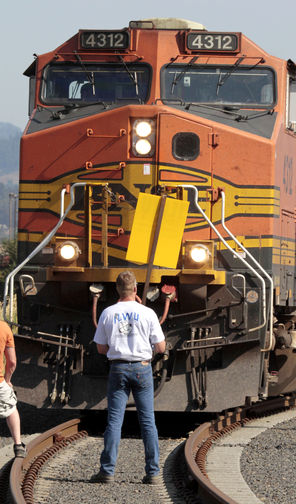forum
library
tutorial
contact

Longshore Workers OK
Northwest Grain Deal
by Mateusz Perkowski
Capital Press, August 26, 2014
|
the film forum library tutorial contact |

|
Longshore Workers OK
by Mateusz Perkowski
|
Longshoremen have OK's a new contract with Northwest grain handlers and will return to work Wednesday.
 Longshoremen are heading back to work at Northwest grain export facilities after approving a labor contract with companies that own the terminals.
Longshoremen are heading back to work at Northwest grain export facilities after approving a labor contract with companies that own the terminals.
About 88 percent of workers represented by the International Longshore and Warehouse Union at the affected facilities voted to approve the deal, which ends a two-year dispute with grain exporters United Grain Co., Columbia Grain Co. and Louis Dreyfus Commodities.
Farmers and grain elevators across the U.S. were affected by the conflict, as it threatened to hinder the flow of grain and oilseeds to major Asian buyers of U.S. crops.
The deal is a relief for Northwest farmers, as recent disruptions at the United Grain terminal in Vancouver, Wash., could have greatly reduced export capacity, said Blake Rowe, CEO of the Oregon Wheat Commission.
"If they didn't get it settled, it would have been a lot worse," he said.
Exports from United Grain facility slowed to a trickle this summer after grain inspectors refused to enter the terminal due to fears of picketing longshoremen.
The recent deal has allowed work to resume before the grain pipeline became seriously backed up, Rowe said. "Anything that creates uncertainty like this is a matter of concern."
The labor contract is effective until 2018 and includes "work rule changes and wage increases" but neither the longshoremen's union nor the grain handlers would disclose the exact terms.
The parties have agreed to cease all litigation over the matter.
The origins of the dispute date back to 2011, when the owners of the new EGT export terminal in Longview, Wash., attempted to employ non-union workers.
This decision prompted longshoremen to spill grain, block trains, smash windows and damage equipment at the facility.
Longshoremen ended up reaching an agreement with the terminal in early 2012, but other grain handlers felt their contracts with ILWU were less competitive than the deal obtained by EGT.
Those contracts expired in September 2012 and the other grain handlers unilaterally imposed terms similar to the EGT deal later that year.
After accusing longshoremen of sabotage and work slowdowns in early 2013, United Grain and Columbia Grain locked out the union from their facilities in Vancouver, Wash., and Portland, Ore.
ILWU responded by picketing the sites and other facilities owned by the companies in the Northwest.
At times, the dispute grew heated.
The National Labor Relations Board alleged that United Grain and Columbia Grain engaged in unfair labor practices by locking out the union workers.
The agency also accused the longshoremen of assaulting security guards at the sites and threatening to rape a manager's daughter.
A federal judge cited the union for contempt of court for ignoring an order not to block grain barges owned by a company that had no influence on the dispute.
Matters came to a head this summer after state and federal grain inspectors refused to enter the United Grain terminal after Washington Gov. Jay Inslee withdrew police escorts in early July.
Grain must be inspected prior to export, so the inspectors' decision effectively stopped most shipments from the facility.
The U.S. grain industry was alarmed by this development, as it could have caused major inventory backups at inland elevators and hurt the industry's reputation in Asia.
Crisis was averted when ILWU and the grain handlers announced they had struck a deal earlier this month, which was recently approved by the affected longshoremen.
It's unclear whether further disputes are on the horizon when the agreement expires in 2018, said Rowe. "Four years is a long time."
learn more on topics covered in the film
see the video
read the script
learn the songs
discussion forum
